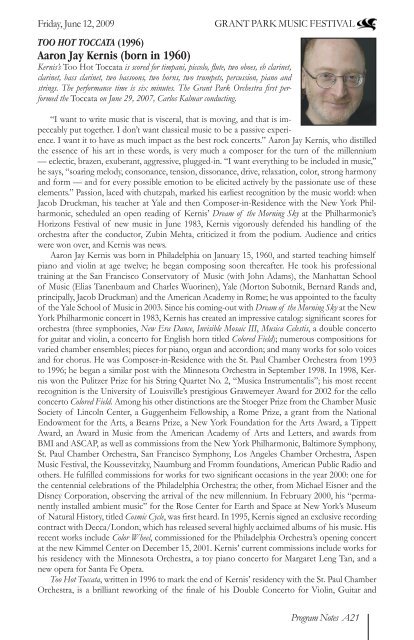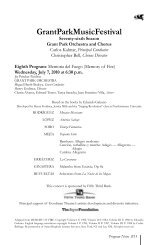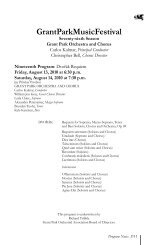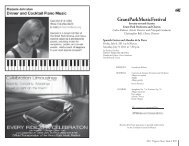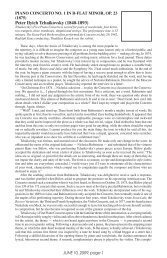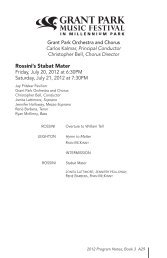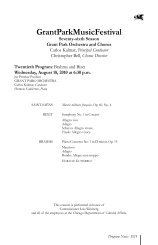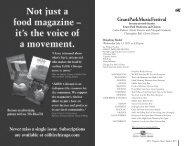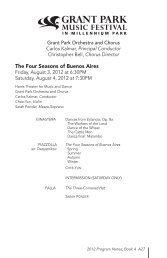Program Notes PDF - The Grant Park Music Festival
Program Notes PDF - The Grant Park Music Festival
Program Notes PDF - The Grant Park Music Festival
You also want an ePaper? Increase the reach of your titles
YUMPU automatically turns print PDFs into web optimized ePapers that Google loves.
Friday, June 12, 2009<br />
GRANT PARK MUSIC FESTIVAL<br />
Too Hot Toccata (1996)<br />
Aaron Jay Kernis (born in 1960)<br />
Kernis’s Too Hot Toccata is scored for timpani, piccolo, flute, two oboes, eb clarinet,<br />
clarinet, bass clarinet, two bassoons, two horns, two trumpets, percussion, piano and<br />
strings. <strong>The</strong> performance time is six minutes. <strong>The</strong> <strong>Grant</strong> <strong>Park</strong> Orchestra first performed<br />
the Toccata on June 29, 2007, Carlos Kalmar conducting.<br />
“I want to write music that is visceral, that is moving, and that is impeccably<br />
put together. I don’t want classical music to be a passive experience.<br />
I want it to have as much impact as the best rock concerts.” Aaron Jay Kernis, who distilled<br />
the essence of his art in these words, is very much a composer for the turn of the millennium<br />
— eclectic, brazen, exuberant, aggressive, plugged-in. “I want everything to be included in music,”<br />
he says, “soaring melody, consonance, tension, dissonance, drive, relaxation, color, strong harmony<br />
and form — and for every possible emotion to be elicited actively by the passionate use of these<br />
elements.” Passion, laced with chutzpah, marked his earliest recognition by the music world: when<br />
Jacob Druckman, his teacher at Yale and then Composer-in-Residence with the New York Philharmonic,<br />
scheduled an open reading of Kernis’ Dream of the Morning Sky at the Philharmonic’s<br />
Horizons <strong>Festival</strong> of new music in June 1983, Kernis vigorously defended his handling of the<br />
orchestra after the conductor, Zubin Mehta, criticized it from the podium. Audience and critics<br />
were won over, and Kernis was news.<br />
Aaron Jay Kernis was born in Philadelphia on January 15, 1960, and started teaching himself<br />
piano and violin at age twelve; he began composing soon thereafter. He took his professional<br />
training at the San Francisco Conservatory of <strong>Music</strong> (with John Adams), the Manhattan School<br />
of <strong>Music</strong> (Elias Tanenbaum and Charles Wuorinen), Yale (Morton Subotnik, Bernard Rands and,<br />
principally, Jacob Druckman) and the American Academy in Rome; he was appointed to the faculty<br />
of the Yale School of <strong>Music</strong> in 2003. Since his coming-out with Dream of the Morning Sky at the New<br />
York Philharmonic concert in 1983, Kernis has created an impressive catalog: significant scores for<br />
orchestra (three symphonies, New Era Dance, Invisible Mosaic III, <strong>Music</strong>a Celestis, a double concerto<br />
for guitar and violin, a concerto for English horn titled Colored Field); numerous compositions for<br />
varied chamber ensembles; pieces for piano, organ and accordion; and many works for solo voices<br />
and for chorus. He was Composer-in-Residence with the St. Paul Chamber Orchestra from 1993<br />
to 1996; he began a similar post with the Minnesota Orchestra in September 1998. In 1998, Kernis<br />
won the Pulitzer Prize for his String Quartet No. 2, “<strong>Music</strong>a Instrumentalis”; his most recent<br />
recognition is the University of Louisville’s prestigious Grawemeyer Award for 2002 for the cello<br />
concerto Colored Field. Among his other distinctions are the Stoeger Prize from the Chamber <strong>Music</strong><br />
Society of Lincoln Center, a Guggenheim Fellowship, a Rome Prize, a grant from the National<br />
Endowment for the Arts, a Bearns Prize, a New York Foundation for the Arts Award, a Tippett<br />
Award, an Award in <strong>Music</strong> from the American Academy of Arts and Letters, and awards from<br />
BMI and ASCAP, as well as commissions from the New York Philharmonic, Baltimore Symphony,<br />
St. Paul Chamber Orchestra, San Francisco Symphony, Los Angeles Chamber Orchestra, Aspen<br />
<strong>Music</strong> <strong>Festival</strong>, the Koussevitzky, Naumburg and Fromm foundations, American Public Radio and<br />
others. He fulfilled commissions for works for two significant occasions in the year 2000: one for<br />
the centennial celebrations of the Philadelphia Orchestra; the other, from Michael Eisner and the<br />
Disney Corporation, observing the arrival of the new millennium. In February 2000, his “permanently<br />
installed ambient music” for the Rose Center for Earth and Space at New York’s Museum<br />
of Natural History, titled Cosmic Cycle, was first heard. In 1995, Kernis signed an exclusive recording<br />
contract with Decca/London, which has released several highly acclaimed albums of his music. His<br />
recent works include Color Wheel, commissioned for the Philadelphia Orchestra’s opening concert<br />
at the new Kimmel Center on December 15, 2001. Kernis’ current commissions include works for<br />
his residency with the Minnesota Orchestra, a toy piano concerto for Margaret Leng Tan, and a<br />
new opera for Santa Fe Opera.<br />
Too Hot Toccata, written in 1996 to mark the end of Kernis’ residency with the St. Paul Chamber<br />
Orchestra, is a brilliant reworking of the finale of his Double Concerto for Violin, Guitar and<br />
<strong>Program</strong> <strong>Notes</strong> A21


